- Home
- Lauren Willig
The Ashford Affair Page 11
The Ashford Affair Read online
Page 11
Who would have thought that Dodo could land the son of an earl? An Irish earl, but still an earl. He had been a younger son when Dodo snagged him, but a well-placed shell had fixed that. Dodo was now the future Lady Kilkenny. Bryan was shorter than Dodo and short an arm, but he had the best stables in Ireland. He and Dodo spoke an incomprehensible argot of hocks and withers. They had settled at Melton, setting a fashion for being fashionable by being unfashionable.
Meanwhile, Bea had fidgeted and fumed back at Ashford. Always Ashford. Someone was needed to keep an eye on the home farm, her mother had said. Her father had greater matters on his mind and heaven only knew what those land girls might get up to.
Bea knew that was rot. Her mother’s instructions contained an endless list of don’ts. Don’t spend too much time in the sun; don’t get brown; don’t ruin your hands. She wasn’t contributing to the war effort, she was being rolled up in cotton wool, stored away to be taken out after the war, like a precious china figurine or a very old bottle of port, too valuable to be jostled.
This. Bea regarded the ballroom with a decided sense of ennui. They were halfway through the Season and Bea felt as though she had been to the same dance again and again and again—the same people, the same clothes, the same music, the same tired streamers, the same gilt chairs tenanted by the same drowsing dowagers.
This was what they had been saving her for. This was what she had been waiting for all those long years, all those endless hours in the nursery at Ashford. This was supposed to be life! Romance! Adventure! And what did she get? Tepid ices from Gunter’s, girls in droopy pastel dresses, and a ballroom full of graying men her father’s age and boys just out of the schoolroom, pulled in to make up the numbers. The band plunked dispiritedly at a waltz. Even though it had been eight months since the Armistice, London still hadn’t quite recovered from the exigencies of the war. Paper streamers and some dispirited vines hung limply in the place of the flowers that had once filled the ballrooms. The hothouses and flower gardens of five years ago had been plowed up for vegetables while would-be debutantes wilted on the vine, aged past their prime as the war raged on.
Out there, Bea knew, beyond these ice-blue walls, there was music and dancing, real dancing. The few able-bodied men in the room, meekly fetching lemonade, being polite to the dowagers, would bolt before the evening was over, seeking out their real entertainment in smoky clubs in the remote hinterlands of the city where there were no chaperones to monitor them, no endless rules and restrictions.
God, she was bored. Damnably, painfully, unutterably bored.
But it didn’t do to show it. The trick, she had learned, was to always look as though one were having the best of all possible times, as though one were reveling in a delightful secret that one just might, with the correct inducements, be willing to share.
She did it now, sending a little half smile over her shoulder at Marcus.
Marcus, Marquess of Rivesdale, center of all her mother’s hopes and ambitions. Six foot two, with the broad build of the born sportsman. Dark blond hair. Ruddy cheeks. Quick laugh. Passable dancer; decent kisser, at least from what she’d been able to discern from a few stolen moments behind a potted palm. They said he played an excellent game of golf.
He wasn’t a bad egg, Marcus. In fact, he was really rather … well. One didn’t go thinking of such things. Love was for the middle classes, her mother said, a sop to their sensibilities. One wasn’t supposed to pay any attention to the little tingles at the back of one’s neck when he smiled; one wasn’t supposed to go weak or woozy or race to the door to see if the flowers that had just been delivered might be from him.
Catching her eye, Marcus grinned. He cocked his head towards the French doors, the French doors leading out onto the ever so convenient balcony.
Bea smiled at him and turned away. Promising nothing. Denying nothing.
“You see?” she said to her mother. “I know what I’m about.”
“I hope you do,” said her mother darkly. And then, as Bea knew she would, she added, “You’re not getting any younger.”
“Really?” drawled Bea. “Time moves so slowly here, I thought I could make it run backward.”
“If you don’t get him,” said her mother severely, “Lavinia ffoulkes will.”
Lavinia ffoulkes? The woman couldn’t even manage an uppercase letter in her last name!
“I have to fix my train,” Bea said, and fled. Only her mother had the power to rout her like that. Only her mother had the power to make her feel like a disorderly schoolgirl, all braids and bruised knees.
Lavinia ffoulkes indeed!
Bea pushed open the door to the powder room. Camilla and Mary had gone; only one girl lingered at the dressing table, dispiritedly readjusting a slightly wilted blossom in her dark hair.
“Thank goodness,” Bea said. She dropped down on the stool next to her cousin. “I’m so glad it’s you. Mother’s been having a go at me. Too shame making.”
“What about?” Addie shifted on her stool, and the flower promptly fell down again.
Bea rolled her eyes. “What else? Marcus. Mother would propose to him herself if she could. Poor Mother. Such a blow to her not to be able to betroth me in my cradle. She would have loved that. Here. Let me.” She plucked the flower out of her cousin’s hand, pinching off the broken part of the stem. “Turn just a bit.…”
“Do you think he will propose?” Addie’s voice was slightly muffled by Bea’s arm.
Bea shrugged. “Why wouldn’t he? Aren’t I prize enough?”
Lavinia ffoulkes, whispered her mother’s voice. That was nonsense. Lavinia was at least as old as she and had a laugh like a squeaky hinge.
“There. Isn’t that better?” She leaned back so Addie could see herself, flower now firmly moored between two carefully placed waves of hair. It had been a good choice; the white flower showed to good advantage in Addie’s dark hair. “I do wish you would let me do something about your eyebrows. I know the cleverest little woman.… Oh, the look on your face! Don’t worry; I’m not going to come after you with a tweezer.”
“Please don’t.” Addie made a comical face. “Besides, you know what they say about silk purses and sows’ ears.”
“You’re hardly a sow’s ear—” Bea broke off, shaking her head at her cousin, feeling the familiar mix of affection and irritation. “The cream shades suit you, and as long as you don’t load yourself down with flounces … You could be such a success if only you’d try a little harder.”
Addie poked at the flower in her hair. “It depends on what you mean by ‘success.’”
Addie had a way of doing that, of taking simple things and making them complicated. It had been worse since the War. Sometimes, Bea didn’t understand her cousin at all.
“What everyone means,” said Bea firmly. “Stop that! You’ll undo all my good work.”
Addie turned her big brown eyes on Bea. She had such lovely brows and lashes; Bea had to resort to kohl to achieve the same effect. “You mean marrying?”
Bea shrugged and opened her bag, wishing desperately that she had a cigarette. “What else is one to do? Stay on with Mother and wind her wool? Run a dreary little shop?”
“It needn’t be dreary.” At Bea’s look, Addie said, “Oh, all right. All I mean is, you don’t have to marry Marcus. If you don’t want to. I know your mother is trying to push you into it.…”
Bea turned away, shoving at a pin that threatened to fall out of her hair. “Don’t be silly. Of course I don’t have to.” That implied all sorts of other things, whispers and scandals and babies who came too soon. “Why wouldn’t I want to marry Marcus?”
She could practically see the wheels turning in her cousin’s head. “He’s a bit—well, he’s a bit ordinary.”
“Ordinary?” Bea was offended on Marcus’ behalf. Didn’t Addie realize how thin on the ground titled men of a comparable age with all their limbs in place had come to be? “Hardly! Look at him. Next door to a duke and not even doddering.
”
“Yes, but do you love him?” her cousin persisted.
Sometimes she thought she did, sometimes when Marcus looked at her just so, or slipped his hand beneath her chin to tilt up her face to kiss. It was both exciting and terrifying. Love has no place in great alliances, her mother had always told her; marriage was a contract, not a novel. People did foolish things for the sake of the madness called love; better not to entertain the notion.
But, even so, sometimes …
Addie just didn’t understand, that was all. Her parents had married for love; they had lived in bohemian abandon in Bloomsbury. She could afford to ask questions about the meaning of success and the value of marriage. Bea didn’t have those options.
They had read their novels together in the nursery, she and Addie, passing them back and forth, sighing over the heroines and heroes, but there was a difference. In fiction, a Rochester could marry a Jane Eyre. In real life, Bea knew, it was the Blanche Ingrams who prospered. She wasn’t being hard; she was just being a realist.
Even so, Addie’s disapproval bothered her.
Bea shoved up off her chair, her bag making a slapping sound as it bounced off the glass top of the dressing table. “You’re being bourgeois, darling. Don’t let Mother hear you talking like that.” At her cousin’s expression, her voice softened. “Don’t worry, dearest. Once I marry my marquess, you can come live with me and marry whomever you like, even if he’s the lowliest chimney sweep.”
“What if I don’t mean to marry?”
Bea shuddered. “Don’t let Mother hear you say that!” Taking Addie’s hand, she tugged her off the stool. “Come along, darling. Come watch me work my wiles.”
Back in the ballroom, the band had switched to a Scottish reel, trying to feign some measure of gaiety. A few couples vainly skipped their way through the forms. Marcus was in one of the couples on the floor, dancing with Lavinia ffoulkes, she of the insufficient capitalization. Lavinia was nearly as old as Bea, another casualty of the Great War, only just making her debut at twenty-one. There was a desperate gaiety in the way she tossed her head, a forced pertness in her exaggeratedly girlish dress. Bea didn’t miss the way she clung to Marcus’ arm when the dance brought them together.
Marcus caught Bea’s eye over Lavinia’s head and grimaced.
There was a group of men hovering, as always, by the refreshment table. Bea nudged Topper Bingham with her elbow. “Go ask my cousin to dance.”
Topper staggered just a bit. “Why can’t I ask you to dance?” he asked thickly. Bea smelled something stronger than champagne on his breath.
Bea assessed him with an expert eye: just drunk enough to be docile, not too drunk to dance.
“Because you already mangled my hem,” she said. “It’s someone else’s turn. Now go. And tell Tommy I expect him to dance with Addie after you.”
There. She had done her bit, and now it was up to Addie. Not that either Topper or Tommy were real prospects; Topper was well on his way to dipsomania and Tommy was the younger son of a younger son, but popularity bred popularity. Popularity drove away disquieting thoughts.
“So that’s where you got to.” She looked up to find Marcus standing there, Marcus, tall and handsome. He was handsome, in that very wholesome English way. He would run to fat in old age, but at the moment he was still a fine specimen. Besides, Bea thought flippantly, he had all his limbs and what more could a girl ask, these days? “I’ve been looking for you.”
“Maybe you just weren’t looking hard enough.” She drew away in a feigned retreat. “Shall I go away and you can try again?”
He chuckled belatedly. “No need for that.”
Bea could hear Addie in the back of her head, clucking.
What if he wasn’t the quickest knife in the drawer? He had other qualities to recommend him. He was handsome. Handsome and reasonably kind. He had picked up a glass for her when she knocked it over the other day. He had put his jacket around her when she had lost her wrap. The memory of it made her fingers tingle, the intimacy of it, the male smells of cologne and tobacco snuggled up around her, the wool of his jacket scratchy against her bare arms.
Marcus looked around, at the rows of dowagers dozing on their chairs. “Fancy a breath of fresh air?”
Was it her imagination, or did he seem just a bit nervous? If he proposed … Marriage, Bea thought. The Rivesdale town house in Mayfair, the Rivesdale sapphires around her neck, a coronet on her stationery.
And Marcus.
“Yes,” she said. It felt like a rehearsal. She smiled up at him, under her artificially blackened lashes, and tried it again. “Yes.”
EIGHT
London, 1999
The firm’s travel agent had booked her into someplace called the Rivesdale House Hotel.
A country house hotel in the heart of London! exclaimed a framed magazine cover, placed discreetly to one side of the front desk. The reception desk sat incongruously in an oval entrance hall that made Clemmie think of a wedding cake, with stucco ornamentation for icing. Her battered black wheelie looked particularly scruffy against the white marble floor. Fortunately, there were no mirrors in the entryway. After seven hours in the air, Clemmie knew she looked worse than her suitcase, still wearing yesterday’s suit with the coffee stain on the right sleeve, where someone had accidentally bumped the stewardess mid-reach.
Even without the coffee stain, her pin-striped polyester Tahari skirt suit looked painfully cheap and American in the hushed dignity of the Rivesdale House lobby.
This had to be Paul’s latest find. Paul was the partner for whom Clemmie worked. Every partner had his own hotel and restaurant preferences. Some liked ultramodern; others preferred brand-name chains. No communing with the vulgar hordes at the Ritz for Paul; he was the disciple of the undiscovered gem, some of which were less gem-like and more discovered than Paul had anticipated.
This one, however, seemed to live up to Paul’s exacting standards. There was no piped-in music, no squabbling families with fanny packs, no courtesy coffee table. A Roman emperor in a roundel looked disapprovingly down his nose at Clemmie from above the fireplace, his toga slipping slightly over one shoulder.
Toga, toga, thought Clemmie, and fought down a chortle of jet-lagged laughter. She hadn’t slept much on the plane. She’d had strange dreams, dreams of flaming planes and shingled flappers with bloodred lips and ice-blue eyes, dancing to the tune of the clickety-clack of shotguns firing in double time. The shotguns had turned out to be the laptop keyboard of the person in the seat next to her, who was clearly far more disciplined than she was. Clemmie had woken up with a crick in her neck and a dent in her cheek where she’d fallen asleep facedown on the binder she was meant to be reviewing.
After two cups of coffee, one on the plane, one snatched at Terminal 4 on the way to the Heathrow Express, she had the floaty feeling she used to get just around finals time in law school, the one where she would go off on laughing jags for no reason in particular because her body had to do something to keep itself awake.
She’d better hope she could pull it together before meeting up with Paul. Paul was the partner on the case, which made him eligible for toga and laurel leaves in the strict hierarchy of law firm life. As a senior associate, she wasn’t quite a gladiator to his imperator, but she was still definitely subject to the imperial will.
Him emperor, her viceroy. The thought of Paul in a toga was enough to make her choke on giggles again.
Must. Not. Lose. It.
“Yes?” The man behind the desk had tired brown eyes and a voice like Hugh Grant in Four Weddings and a Funeral.
“Evans,” Clemmie said, more brusquely than she had intended. Her eyes were watering from sleep deprivation and suppressed laughter. “Clementine Evans. You should have a reservation for me.”
The clerk must have been used to dealing with Americans. If he thought her rude, he didn’t show it, just consulted a surprisingly modern computer, hidden behind the fronds of a potted palm.
�
��Room three-oh-two,” he said. “Will you need help with your bag?”
“No, I can manage,” Clemmie said, before remembering that in London “three” meant “four.” She’d be very surprised if Rivesdale House had anything so vulgar as an elevator. Damn. The bag, which wasn’t that heavy when rolled along, could be very heavy indeed when lugged up three flights of stairs.
It would be just like Paul to make sure his juniors were stuck away three flights up, where the servants used to live. It was the sort of petty put-down in which he delighted.
The man behind the desk was already doing something arcane to the computer. “Passport, please?”
She slid it over. “Has Paul Dietrich checked in yet?”
The desk clerk paused over her passport, looking distinctly wary. “Would you like to leave him a message?” he asked.
She didn’t look like an international hit man, did she? But, then, neither had John Cusack in Grosse Pointe Blank. Or maybe he thought she was an angry wife, tracking down her husband’s suspected infidelities. Or something like that.
“I don’t need his room number or anything.” Clemmie took her passport back. “I just need to know if he made it in. I’m supposed to meet him here. We work together.”
The clerk visibly relaxed. “Right.” He said apologetically, “I’ve just started, you see. Still learning the ropes.”
“No problem,” said Clemmie, and smiled at him to show there were no hard feelings. “I can’t even begin to imagine.”
“Neither did I,” said the clerk with a wry smile.

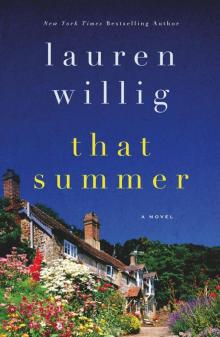 That Summer
That Summer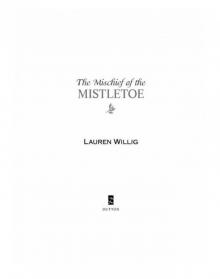 The Mischief of the Mistletoe
The Mischief of the Mistletoe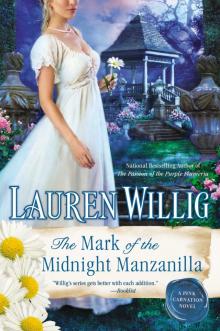 The Mark of the Midnight Manzanilla
The Mark of the Midnight Manzanilla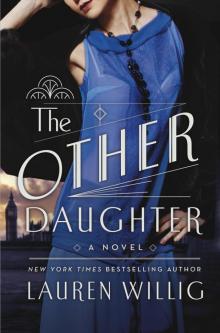 The Other Daughter
The Other Daughter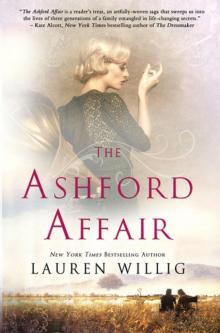 The Ashford Affair
The Ashford Affair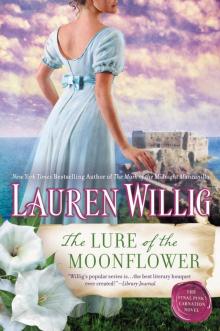 The Lure of the Moonflower
The Lure of the Moonflower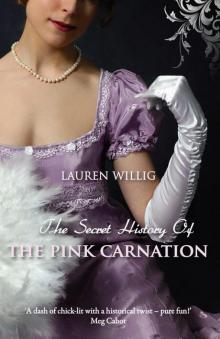 The Secret History of the Pink Carnation
The Secret History of the Pink Carnation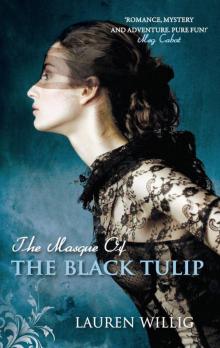 The Masque of the Black Tulip
The Masque of the Black Tulip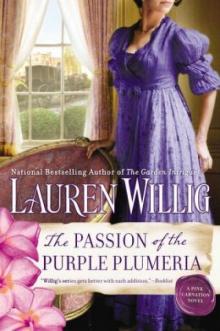 The Passion of the Purple Plumeria
The Passion of the Purple Plumeria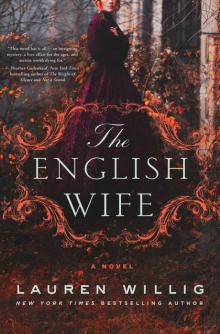 The English Wife
The English Wife The Garden Intrigue
The Garden Intrigue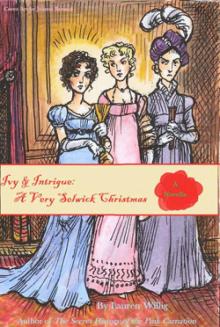 Ivy and Intrigue: A Very Selwick Christmas
Ivy and Intrigue: A Very Selwick Christmas The Orchid Affair
The Orchid Affair The Summer Country
The Summer Country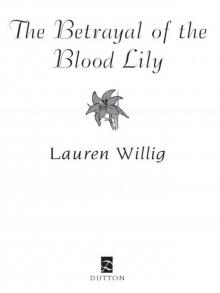 The Betrayal of the Blood Lily
The Betrayal of the Blood Lily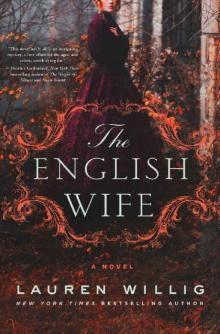 The English Wife: A Novel
The English Wife: A Novel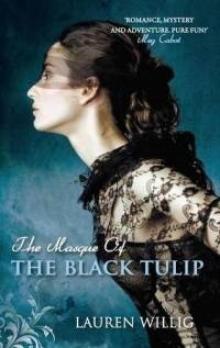 Masque of the Black Tulip pc-2
Masque of the Black Tulip pc-2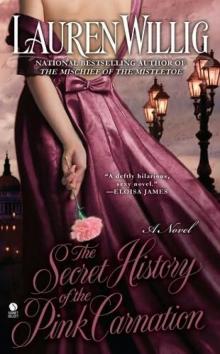 The Secret History of the Pink Carnation pc-1
The Secret History of the Pink Carnation pc-1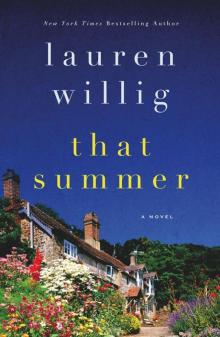 That Summer: A Novel
That Summer: A Novel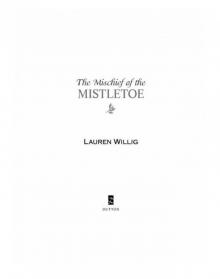 The Mischief of the Mistletoe: A Pink Carnation Christmas
The Mischief of the Mistletoe: A Pink Carnation Christmas